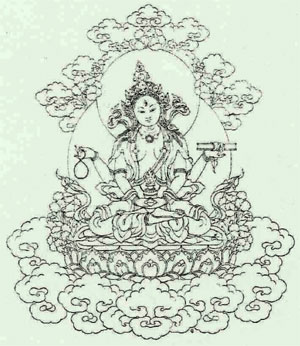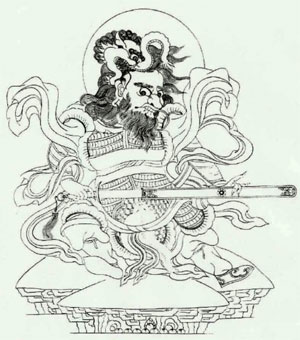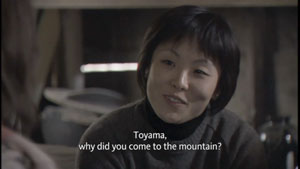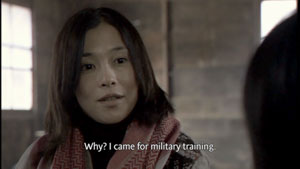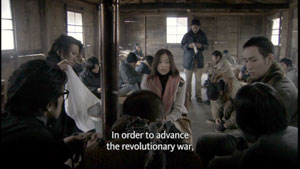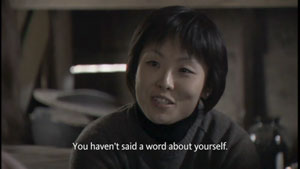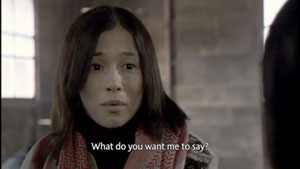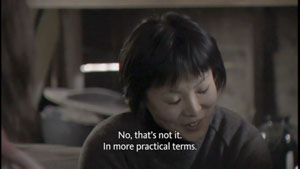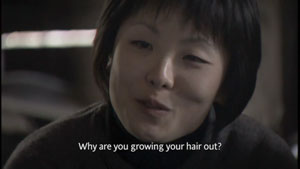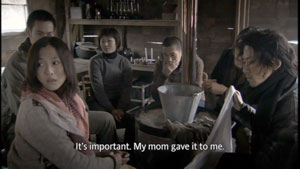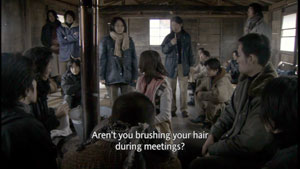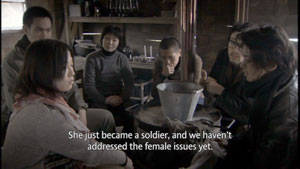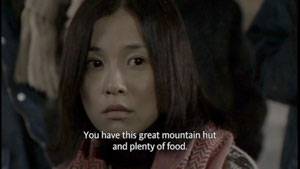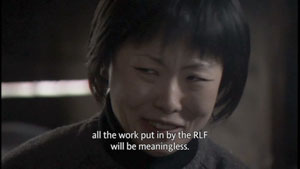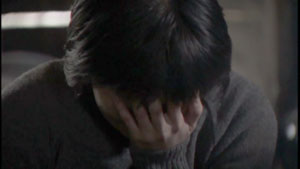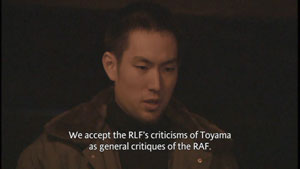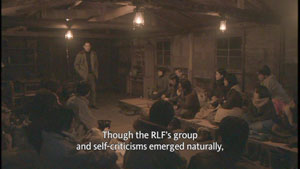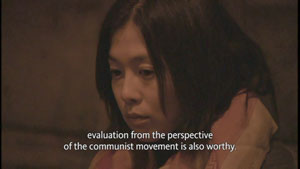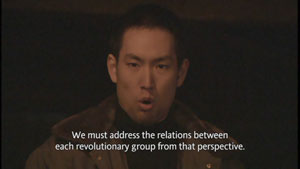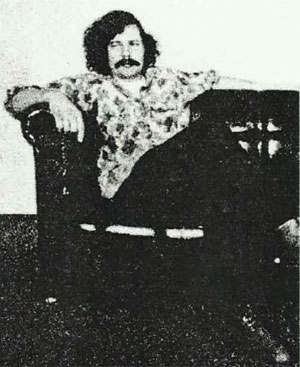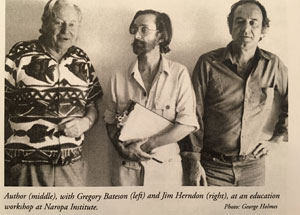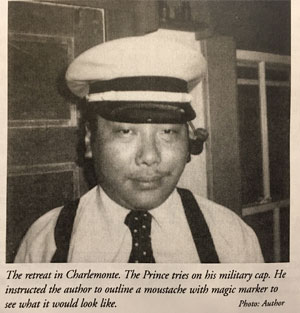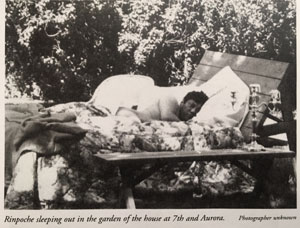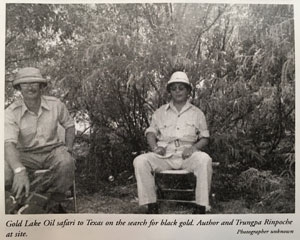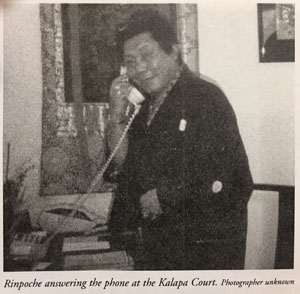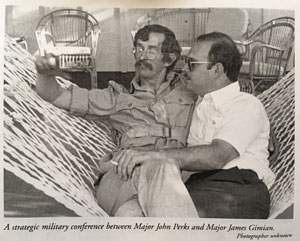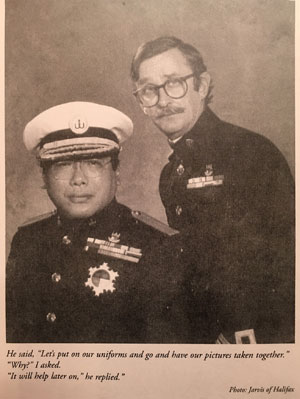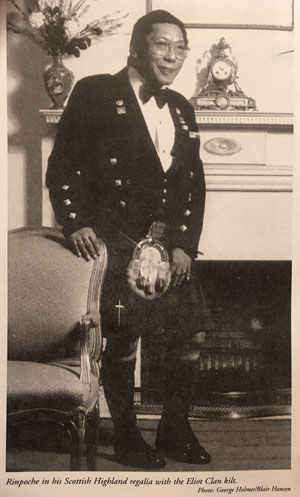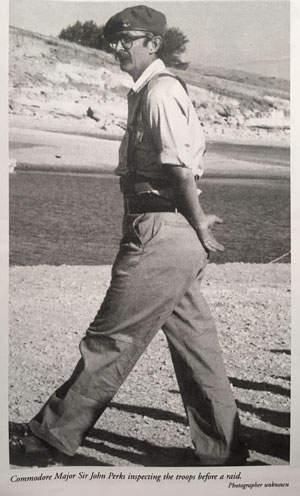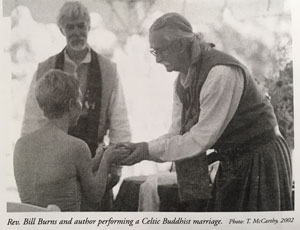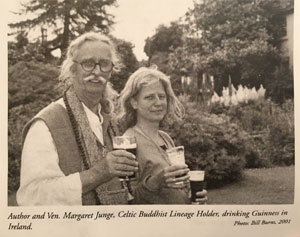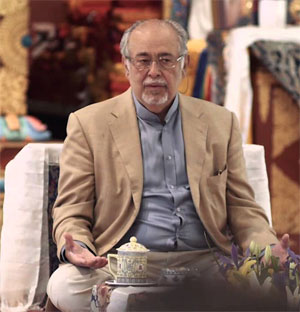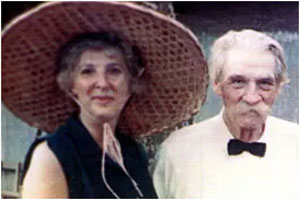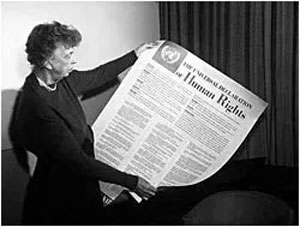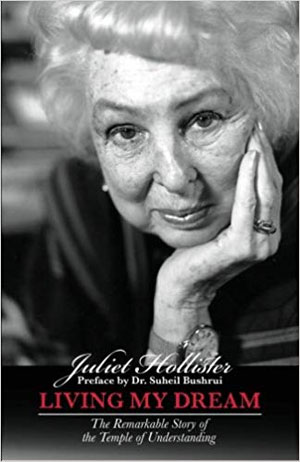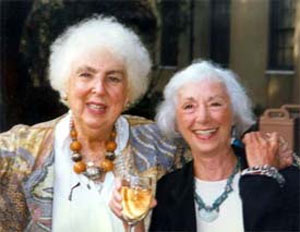Behind the Veil of Boulder Buddhism: Ed Sanders, The Party
When the Party's Over: An Interview with Allen Ginsberg
by Ed Sanders
Boulder Monthly
March, 1979
The Party: A chronological perspective on a confrontation at a Buddhist Seminary
NOTICE: THIS WORK MAY BE PROTECTED BY COPYRIGHT
YOU ARE REQUIRED TO READ THE COPYRIGHT NOTICE AT THIS LINK BEFORE YOU READ THE FOLLOWING WORK, THAT IS AVAILABLE SOLELY FOR PRIVATE STUDY, SCHOLARSHIP OR RESEARCH PURSUANT TO 17 U.S.C. SECTION 107 AND 108. IN THE EVENT THAT THE LIBRARY DETERMINES THAT UNLAWFUL COPYING OF THIS WORK HAS OCCURRED, THE LIBRARY HAS THE RIGHT TO BLOCK THE I.P. ADDRESS AT WHICH THE UNLAWFUL COPYING APPEARED TO HAVE OCCURRED. THANK YOU FOR RESPECTING THE RIGHTS OF COPYRIGHT OWNERS.
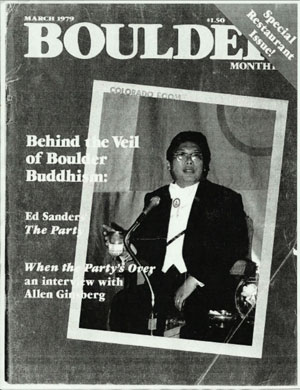
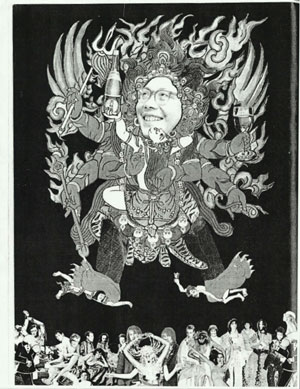
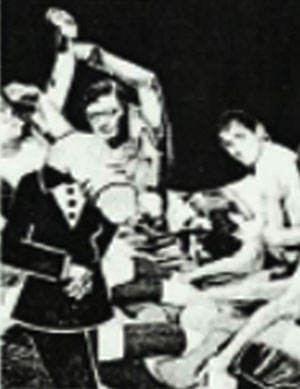
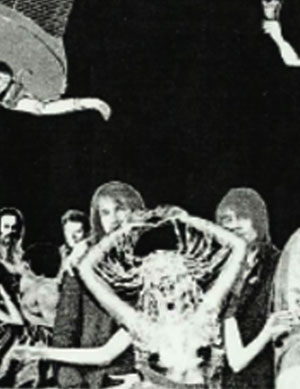
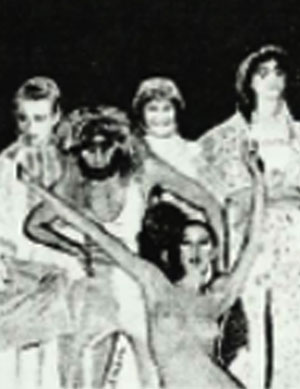
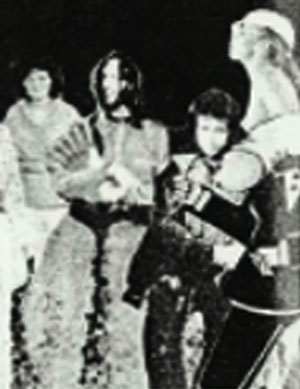
That fall while Rinpoche was away, after one particularly difficult week, I phoned him to ask again for his help. He was at the 1975 seminary in Snowmass, Colorado, a program that lasted three months, and wouldn't be back for at least another month. The seminary that year in Snowmass ended up being quite difficult in certain respects. Against his better judgment, Rinpoche had allowed the American poet W S. Merwin, who had spent the summer at Naropa, and his girlfriend, Dana, to attend the seminary, although they were extremely new to our community. As the Vajrayana section of the seminary approached, Bill (Merwin) and Dana remained isolated from the rest of the participants, and Rinpoche felt they weren't connecting with him or with what he was trying to teach.
On Halloween things turned ugly. There was a costume party that night, which Bill and Dana tried to duck out of. From what I heard, the situation got quite extreme. Rinpoche had suggested that rather than using costumes to disguise themselves, people should unmask and expose themselves. He told people that they should literally unmask by taking their clothes off. Everybody got naked. Rinpoche noticed that Bill and Dana weren't there. He insisted that they should come to the party too and sent students to rouse them from their room at the hotel. When they didn't answer the door, the messengers broke in through the balcony. Bill became alarmed and fearful, and he cut one of them with a jagged piece of broken glass. He and Dana were eventually brought down to the ballroom, where they were stripped of their clothing. It was pretty shocking.
A day or two later, Rinpoche told Merwin and Dana, as well as all the other participants, that they could leave the seminary or they could stay. They remained, but after the program ended, they left for good. The story filtered out of the seminary -- in fact, nobody was trying to hide what had happened. Investigating the incident actually became a class project in the poetics department at Naropa Institute a year or two later, and the story made its way into an article in Harper's magazine in 1979. Although I wasn't there when these events transpired, I was with Rinpoche in situations that were probably as extreme as that. If he felt that the elements of a situation were ripe to puncture delusion or self-deception, he never held back -- though I don't expect people to understand or accept this at face value.
-- Dragon Thunder: My Life with Chogyam Trungpa, by Diana J. Mukpo with Carolyn Rose Gimian
Introduction
I was invited to teach a course at the Kerouac School of Disembodied Poetics in June and July of 1977. I decided to title the course Investigative Poetry, based on the poetic principles explored in my book of the same name published by City Lights Books.
I prepared a series of lectures around the central themes of Investigative Poetry, namely that poets assume a greater portion of the description of historical events, as in ancient civilizations, utilizing data-collection and investigative techniques of a data retentive era such as ours.
It was my objective to encourage students to write samples of investigative verse, and for the entire group to take on an investigative project on an issue in the Denver-Boulder area. I had thought the group might choose to undertake some bardic sleuthery out at Rocky Flats, or to examine the strike that was then going on at the Coors company, or perhaps to fan out in the direction of Sterling, Colorado, to try to beam some hard Sophoclean light on the cattle mutilations case.
Prior to arrival at Naropa Institute I had never heard of the stripping incident at Snowmass, Colorado. Better to fill one's mind with the Galactic Land-Fill than the gossip of bard-babble. At an early meeting of the Investigative Poetry class, there was a general discussion on what sort of bardic sleuthery to undertake. To my surprise the class decided overwhelmingly to take a look at the circumstances of the Halloween party. Robert Bly had recently read in Boulder, and had delivered an energetic stage rendition of the stripping, which had created quite a stir. Wherever one went on the Boulder literary scene that summer, the matter was dancing on many lips, yet few seemed certain as to what actually had transpired at Snowmass. The National Endowment for the Arts had recently turned down a grant request from the Kerouac School, in part, it was thought, because of gossip about the Merwin-Naone-Trungpa matter spreading in literary circles. The case, as they say, was hot.
It seemed like a matter fit for careful elucidation. I agreed to procede, serving as project coordinator, with "Not to assume facts not in evidence" to be the guiding principle of the investigation. The main ground rules were that everyone participating should prepare detailed question lists, or Q-Lists, prior to interviews, and to try to tape record interviews where possible, and to write detailed reports and transcripts of interviews.
The Investigative Poetry Group was extremely eager to work, and the walls of my apartment at Naropa faculty housing grew fairly filled with large "now charts" tracing in chronological detail what was known about the stripping incident at that time. My apartment became the "Squad Room." The work was ceaseless. Investigators arrived early in the morning, to prepare Q-lists, to work on the now charts, to prepare transcripts of interviews. Sometimes there were five typewriters being used at once in the living room. A couple of times the work lasted till dawn.
The bulk of the 179-page report was finished in less than a month. Only the inspired dedication of the 24 people in the Investigative Poetry Group made it possible. Anyone who has spent time at Naropa will know the distractions -- the rounds of dinners, the readings, the lectures, the lure of the mountains, the parties, the logging of thrill-units.
It would be proper to say that Naropa was less than eager for the report to be written, but on the other hand at no time, then or now, did anyone try to suppress the investigation, or to harass anyone who was preparing it. In addition, the Kerouac School in my opinion is an important and unique institution of poetics in America. It bubbles with creativity; with the exchange of ideas on an elevated plateau. It has brought a vast spectrum of poets to Boulder from many different poetic and metaphysical perspectives. People no doubt will soon, if not already, begin to write PhD theses on the Kerouac School.
On the other hand, the incident at Snowmass was an encroachment that should not be allowed to be repeated. One sure way to prevent such encroachments among sane people is through relentless, ethical investigations such as the one that produced The Party.
Regarding publication of The Party, the Investigative Poetry Group proceded democratically. During the summer of 1977 the group voted to delay any decision on publication for a few months. In October-November of 1978 a vote was conducted by mail, with the result being 14-4 to publish. The full text will be published this year by Poetry, Crime, and Culture Books, Woodstock, New York.
-- Ed Sanders
Anne Waldman suggests Naropa to Merwin, New Year 1975
Anne and Merwin ran into each other in NYC street just before New Year 1975. Anne had met Merwin once or twice before but didn't know him personally very well, though she knew and respected his work.
Anne and Merwin met for a New Year's toast and had intense spiritual discussion -- "Meaning of life, death, pain."
"Merwin was asking me about teachers. Tibetan teachers. So he was interested in some way connecting with a teacher ... I don't think he had a clear idea of what he wanted to connect with, necessarily. We didn't know each other terribly well, but I guess he knew that Michael and I and John Giorno had travelled to India and connected with certain lamas there and he was curious about connecting himself in some way -- and I think it was fear of death, getting older, some kind of quest in his own life. We had a very interesting conversation about Buddhism and my relationship to it. I said I was not going back to India, in fact. I was going out to Naropa that summer, '75, to work and run the Kerouac School, but that it was a Buddhist situation and perhaps he could connect this way. Connect with Chogyam Trungpa. And I think he knew something about Chogyam Trungpa, perhaps read his books, I don't know.
"... I felt genuine warmth and compassion from Merwin in his wanting to come (to Naropa) and study Buddhism... It was Merwin's own decision to come. I merely suggested he come. He was very ripe for a move toward this."
-- Anne Waldman (Santoli) 6/23/77
Merwin at Naropa as a Buddhist student
Summer of '75 Merwin was interested in Trungpa as a teacher, was very adamant about his desire to go to the seminary. It was somewhat out of the ordinary ... people are supposed to apply a long time ahead of time ... there are certain advance requirements. "So it was a favor."
-- David Bolduc (M. McCabe) 6/24/77
Merwin came to Colorado with the idea of studying Buddhism and for the mountains ... had been interested in Buddhism for a long time: sat in meditation long before anyone knew ... had had contact with Trungpa before summer of '75 (lectures, might have met him informally) ... he has a strong belief in book learning and western intellectual study which set him in immediate temperamental opposition to Trungpa's 'crazy wisdom' direct experience ... he also has a strong populist belief in the complete privacy of individuals and of not submitting to external controls (he once turned down a lucrative teaching job because of his refusal to pledge allegiance to N.Y. Constitution) ... thought he could go to the seminary and study Tibetan Buddhism in a scholarly way without committing himself to the dogma or initiation ... thought he could simply live his own life there.
Matthews sees the incident as an inevitable clash of two entirely different ethos ... thinks there was no way to avoid it, though it needn't have taken such a vicious form.
-- Wm. Matthews (Blair) 6/24/ 77
"Merwin was at Naropa on the Path. He wasn't here for the poetry scene, that was the last thing he wanted to get involved with. In fact, he always kept a bit of a distance because he sees himself as a loner (in the literary scene) ... But he was very very generous in terms of the poetry scene because he was here for another ultimate purpose."
-- Anne Waldman (Santoli) 6/23/77
Merwin & Dana Naone
Merwin and Dana had gotten together just prior to Naropa. Newly connected. Like on their honeymoon. Dana is quite a bit younger than Merwin.
-- Anne Waldman (Santoli) 6/23/77
Merwin knew he would be treated special as poet laureate of New Yorker -- guest star of Trungpa and Trungpa's scene ... assured that he wouldn't be "Everyman." Merwin was invited to everything all summer at Naropa.
Merwin had very horny mentality -- liked girls a lot -- considered himself 'dashing.'
During the summer Merwin and Dana were overcompensating physically.
-- John Steinbeck IV (Santoli) 6/ 21/77
Dana was mannerly, from an aristocratic Hawaiian family. She was very happy about being with Bill -- "everything is wonderful" -- they never fought. She missed Hawaii. She and Bill had recently met in Hawaii. Dana was extremely possessive of Bill and jealous of the possibility of him flirting with other women.
-- Simone Lazzeri (Santoli) 7/5/77
Merwin got very seriously into the Buddhist practice -- meditating diligently and studying. Dana also got into it -- Dana is not a frivolous character.
-- Jim Hartz (Santoli) 6/28/77
Merwin teaches at Naropa
"Merwin was here as a student and prospective Buddhist ... and attended poetry classes. Dana was a student in the Visiting Poets Class. Merwin visited and participated out of his own generosity, got paid something but not officially paid like other poets. He told me he wanted to be here as a student rather than Bill Merwin the poet.
"He gave a reading with John Ashbery, two lectures in the Visiting Poets Academy and one special workshop to go over students' works."
Merwin asked Anne how she taught poetry, not believing you can actually teach poetry.
-- Anne Waldman (Santoli) 6/23/77
Merwin & Dana Naone attend the Trungpa ITS at RMDC following Naropa summer
Merwin and Dana went to the ITS (Intensive Training Seminar) taught by Trungpa at RMDC (Rocky Mt. Dharma Center, Livermore, Colorado) after the Naropa summer ended.
-- Anne Waldman (Santoli) 6/23/77
"Merwin and Dana had the nicest house at RMDC ... Before one of the last ITS Trungpa lectures, Merwin and Dana talked with Jeanine Hughes and I about seminary. Jeanine told Bill and Dana about the claustrophobia of being indoors with all those people ... Dana replied, 'But you can always go in your room and lock the door, right?'"
-- Tom Hast (Santoli) 7/5/77
Trungpa invites Merwin to seminary
"I think they [Merwin and Trungpa] had gotten friendly socially. Merwin had gotten very involved with Trungpa's weekly lectures and being a good student -- studying, reading the recommended material, taking notes." Merwin and Dana were sitting regularly.
"... so I really don't know what passed between them (Merwin and Trungpa). I would imagine it was some talk about poetry, some dharma talk, although at the time Merwin was really a beginning student although I think he was really applying himself and felt ready to jump in, and convinced Trungpa of that, you know, that he was ready for seminary. Just by his eagerness, curiosity, energy, attention, brightness, facility, all those things."
-- Anne Waldman (Santoli) 6/23/77
A lot of people said good things to Trungpa about Merwin that summer. Trungpa was seemingly more impressed with Merwin than any other of the poets -- he didn't invite any other of the poets to the seminary. Trungpa is usually skeptical of poets because of the way they work with ego.
-- Tom Hast (Santoli) 7/5/77
"Requirements [seminary] are more in the terms of understanding the three Marks of Existence. So it's not purely a question of how long have you been a member of Vajradhatu, but what kind of understanding you have ... Really, the fundamental basis is the sense of spiritual materialism. (Which is) 'Am I going to get something out of this?' . . . The basic criterion for going to the seminary, really, is understanding that that doesn't work, which is the same thing as understanding egolessness and impermanence."
No one quite knows if Merwin and Dana had that understanding. Rinpoche goes through the applications.
-- Jeremy Hayward (A. Trupp) 6/26/77
"Merwin very much wanted to go to seminary. During the time he was waiting to know he was very anxious, hoping it would work out.
"I don't think he knew what he was getting into (Merwin). And I really think he might have been much better off going to Tassajara and just sitting for a year. He had never done a retreat before he went to the seminary. He had never done a week retreat that I knew of. He was always with his woman, which you kind of put that aside when you go off on an individual retreat and so on. I really don't think he was really ready for the power of the teachings. As a Tantra student I have access to transcripts of that seminary -- it's very powerful. Very very powerful material.
"Trungpa is the one to say who's ready for it ... Right, he accepted Merwin. Well, maybe this is what's supposed to happen. Part of, ah, Merwin's journey."
-- Anne Waldman (Santoli) 6/23/77
On learning of his seminary acceptance, Merwin had to rearrange his plans for going back to France.
At a cliff house dinner party, a couple of days after Merwin's seminary acceptance, Dana's unusual nervousness gave Simone the impression that Dana was curious and fearing the seminary.
-- Simone Lazzeri (Santoli) 7/5/77
"If Dana had not been along, things might have been different for Merwin at the seminary ... she wasn't into anything at all except Bill. She was all excited about going to seminary but had absolutely no idea what was involved." Dana wasn't properly taken into account by Trungpa or Merwin in the seminary invitation.
-- Tom Hast (Santoli) 7/5/77
At the cliff house dinner a couple days after seminary acceptance Merwin said that Trungpa said something to him about giving up private space during the seminary acceptance conversation.
-- Simone Lazzeri (Santoli) 7/5/77
"The only person who is still a private individual in Germany is somebody who is asleep."
-- Robert Ley, from "The Origins of Totalitarianism, by Hannah Arendt
The Vajradhatu Seminary
The Seminary was held for three months, beginning around Saturday, September 1, 1975, and lasting till around Thanksgiving, November 27, 1975. It was held at a rented ski lodge (the Eldorado Lodge) in Snowmass, Colorado, located on Route 82, approximately 14 miles northwest of Aspen.
The layout of the lodge and grounds is important in understanding some of the events transpiring at the Seminary.
The ski lodge was located on a hill about three stone's throws from the meditation hall (a converted bar) which lay down the hill from the lodge. Living quarters, the swimming pool, and the room where the Halloween party was later held, all were located at the lodge.
Chogyam Trungpa, Rinpoche, lived at a separate house during the seminary.
-- Interviews with Alan Marlowe 6/26/77 and Paul Shippee 6/30/77 (Sanders)
According to an interview with Alan Marlowe, couples without children were housed on the top floor, including William Merwin, and Dana Naone: the middle floors by singles: and the basement by people with children.
General Information about the Seminary
Ron Stubbert was the coordinator of the 1975 Seminary. In an interview with Al Santoli on July 6, 1977, he related the following information about it:
- Cost for seminary was $550.00.
- The sponsoring group was Vajradhatu.
- Seminarians came from all over the United States.
- There were 125-130 people in attendance, chosen from around 450-600 applications.
- The seminary involved a great amount of sitting and disciplined study, so that spouses, unless part of the seminary, were discouraged from visiting: although in certain situations outside visitors were allowed.
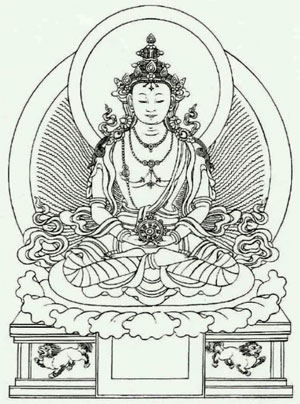
How were individuals selected for the Seminary?
In an interview with Joshua Zim conducted on June 20, 1977, Zim stated that the final choice of people to attend Seminary was Trungpa, Rinpoche's. The usual qualifications were having previously sat a dathun (30 day sitting period) and taking courses at Naropa or study groups through Karma Dzong. However, the selection process was very subjective on Rinpoche's part, and involved "ripeness" and Rinpoche's "cooking up chemistry" and creating a group process. Zim said persons who were otherwise qualified by study and length of association with Rinpoche might not be selected to attend the seminary because they didn't fit in with the group Rinpoche was creating.
-- Joshua Zim (Al Sobel) 6/20/77
"... Rinpoche's been working with students for six years, seven years now, and all of us are constantly understanding new complexities and new subtleties of what the student-teacher relationship is, which is extremely central to vajrayana Buddhism and those of us who are Buddhists, and just as of the one hundred and thirty-five (135) persons at Seminary, you'd probably get 135 different understandings and emotional reactions as to what happened ... "
-- William Mc Keever (La Haye) 6/27/77
"No one was allowed in the seminary ... where Rinpoche didn't feel he had enough feeling of what was going on."
-- Jack Niland (Santoli) 6/23/77
The Course of Study
At the seminary, approximately a month's time each was devoted to Hinayana, Mahayana, and Vajrayana study, with Vajrayana study reserved for the concluding month of the seminary.
The schedule involved two weeks of lectures and classes followed by two weeks "where you'd do nothing but sit."
-- Jack Niland (Santoli) 6/23/77
"The discipline was kept by keeping records publicly posted of how much each person was sitting ... attendance was taken six times a day ... very boot camp, in that sense, that there was no honor system going on here at all."
-- Jack Niland (Santoli) 6/23/77
"It's like joining the army. You know what's going on, and you know what you're gonna get, what's going on ... You had to sit so many times ... pass so many examinations in Hinayana, Mahayana ... very structured."
-- Jack Niland (Santoli) 6/23/77
The Vajradhatu Seminary and perceptions of Merwin on the part of witnesses and friends.
1. Merwin thought he could go to the Seminary and study Tibetan Buddhism in a scholarly way without committing himself to the dogma or initiation ... (He) thought he could simply live his own life there.
-- Interview with William Matthew's (R. Blair) 6/24/77
2. Merwin has a strong belief in book learning, and western intellectual study, which set him in immediate temperamental opposition to Trungpa's 'crazy wisdom' direct experience. (He) also had a strong belief in the complete privacy of individuals, and of not submitting to external controls. He once turned down a lucrative teaching job because of his refusal to pledge allegiance to the N.Y. Constitution.
-- Interview with William Matthews (R. Blair) 6/24/77
Merwin and chanting at the Seminary
Merwin gave off a clean, pure image -- no meat, no bloody chants. He refused to gekkho because he would not recite the violent chants.
-- Interview with Persis McMillen (Santoli) 7/1/77
"... but the kind of vajrayana chants that we were doing from the beginning, vitality chants that have a good deal of very wrathful images in them -- you know, cutting off the heads of people and leaving them to Dharmadhatu ... Tibetan vajrayana art ... based on compassionate anger, where if you can't subdue your ego then you call upon wisdom to cut the aorta of ego . .. but everyone knows by then that the violent images are totally the idea of enlightened anger, vajra anger ... not to totally destroy you, but to only destroy your problem ... And that Merwin, in his questions, was constantly talking about God as a reference point and very peace and lighty, you know. He would do the chants that were very peaceful chants ... but whenever it came to a chant that had anything ... any kind of deity holding a sword in his or her hand ... he would make sort of a big point of not doing it ... putting his chant down and not chanting." [/b]
-- Jack Niland (Santoli) 6/23/77
William Merwin describes seminary, and the violent chants, and a possible Trungpa grudge
Question 3 (whether Trungpa might have borne a grudge because of anything before the party.) Speculation on Trungpa's state of mind, I think, is unlikely to lead very far. Doubly so since much of the information that he had about those studying at the seminary apparently was carried to him by confidants, his guards in particular. But at our one private meeting with him before the party, we had spoken of our objections to the bloodthirsty nature of some of the chants, and more particularly to his increasingly frequent and heavy sneers at other religious and contemplative traditions. We said that the attitude he was expressing toward other traditions was making us less and less open to the idea of taking vows with him. Incidentally, we were only in a limited sense students of Trungpa's. We had read his books and seminary transcripts, listened to tapes, and attended his lectures during the summer, and before seminary I had had one short interview with him. But we were members of no group in his organizations, had taken no vows at all with him, had made no promises to obey him. On the few occasions at which we'd spoken with Trungpa socially, during the summer, and at the one meeting with him at seminary before the party (and even at the one after it) we seemed to be able to speak together directly, relatively openly, and with good feeling; when he referred to the same subjects later, in public, his tone and manner were in sharp contrast with the way he talked with us in private.
-- William S. Merwin, letter to Pope, Pickering, and Trupp 7/20/77
Concerning the so-called Vajra Guards
According to several interviews, the Vajrayana Security Guards had not been formally constituted at the time of the 1975 Seminary. There is some indication (interview with Alan Marlowe on 6/26/77) that events transpiring at the Seminary may have been a factor in the formal organizing of the guards. According to an interview with Persis McMillen (Santoli, 7/1/77) the idea of "guards" at the seminary bothered Bill Merwin and others a lot: that a built-in power structure can appear, on its surface, to be a totalitarian venture.
"People would volunteer ... There would always be a ... a guard is kind of a loaded name ... loaded word. People would volunteer to keep watch over Rinpoche's house, so nobody would break in: so he wouldn't be disturbed by any crazy people around, which there were a few .... Someone ... a snowman at Aspen ... been known to harass in the past ... 1975.
"People volunteered, not specifically for that -- it was more out of devotion, friendliness with Rinpoche, to take some kind of delight in being in his house, letting people in, letting people out, that kind of thing. Also ... when he entertained."
-- Interview with Richard Assally (Faigao) 5/27/77
Merwin and Dana at the Seminary
"If one of them was sick, the other one would stay home. If one of them had kitchen duty, the other one would just do it anyway. So, they would be together ... They were never apart, and when they were together ... they were always entwined in some absurd physical contortion ... it was actually a joke."
-- Interview with Barbara Meier (Faigao) 6/29/77
"The main point was: Seminary is the kind of experience where everything is shaken up. Bill's reaction was to make himself even more solid in terms of his relationship to things. Bill's (goal) was to grow ... to sort of drown himself in this thing ... but he was also holding back. They [he and Dana] had their meals in their room ... Up to the point of the party he was fairly comfortable ... but his participation was not that ... I mean of all people there he was probably the most out of it."
-- Interview with David Bolduc (McCabe) 6/24/77
"Merwin had his very definite lifestyle, which included, for instance (at Zendo-like dinner in shrine room), he would have Dana wait on him ... She would go up and get his food and kind of serve it to him, sort of very, you know, slave-like."
-- Interview with Jack Niland (Santoli) 6/23/77
The Pea Shooters
Allegations had been made that Trungpa Rinpoche had, on occasion, shot people with peas through a pea shooter, during the early parts of the seminary: and that at some point had issued peas, peashooters, and goggles to his guards.
According to an interview with Paul Shippee (Sanders, 6/30/77) on one occasion a guard zapped Alan Marlowe in the eye with a pea, and Marlowe punched the guard out.
The Talk on Discipline
"What happened was that oddly enough Rinpoche thought we were all being too good ... trying too hard, and that was very suspicious."
It was in the middle of Mahayana study, about halfway through the seminary, when there was a meeting called for the lecture hall down the hill from the hotel.
"Absolute total attendance was required ... roll call.... The hotel was emptied. Then we were told that Rinpoche decided to cancel his talk on discipline."
Rinpoche was playing "an enormous practical joke on us."
The guards were outside, with "a huge stockpile of snowballs and peashooters ... " which "bombarded us."
"Everyone had a sack of peas, and it was like blasting your way back into the hotel.... It really got carried away ... squirting fire hoses up and down the hotel. People were shoveling snow into the hotel, as we took over floor by floor.... It was just like being kids .... Well, unfortunately, it got a little serious and people got genuinely pissed off."
-- Jack Niland (Santoli) 6/23/77
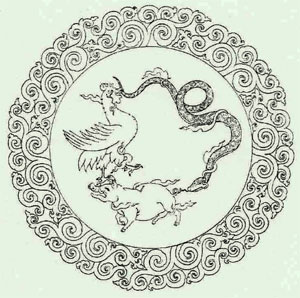
The snowball fight, the Toyota packed with snow, and the inidents between Trungpa's guards and the seminarians.
Regarding the night of the snowball fight (Ron Barnstone, one of the guards, objected in interview [Blair, 6/24/77] to calling incident a "snowball fight"). Alan Marlowe said that everybody was required to attend a lecture in the hall (the converted bar) down the hill from the lodge. The lecture was scheduled for 4:30 in the afternoon. Whereas, though, Trungpa is often late for lectures, it became apparent after a wait on this occasion of about one and one-half hours, that he was not going to show up, so people began leaving. When they left the lecture hall, they noted that the hotel up the hill was manned by snowball-hurling guards, on the roof and on the balconies.
-- Alan Marlowe (Sanders) 6/26/77
There were also guards "armed" with pea shooters outside the lecture hall, and apparently they spat dried legumes at the exiting seminarians, through plastic tubes.
-- Interview with Paul Shippee (Sanders) 6/30/77
Sides were quickly drawn. "We moved up the hill. They were throwing snowballs from the roof, and from the balconies," said Alan Marlowe. Marlowe felt that Trungpa wanted them to respond to the attack with maximum efficiency, so he led a small group that attempted to break into Trungpa's room. (Trungpa apparently was in a room on the top floor of the lodge.) Marlowe relates that he managed to get his arm inside Rinpoche's door, but that his cohorts waxed hesitant at that critical moment, and that his arm was thereupon nearly broken.
-- Alan Marlowe (Sanders) 6/26/77
Rinpoche apparently offered hmself upon a balcony as a snowball target. "... Rinpoche was standing up there on the balcony like this general leading his troops. Rinpoche to me was setting himself up as a target, 'cause he stayed on that balcony ... ice balls ... and he let everyone throw snowballs at him ... Rinpoche undermining our tight little concept of discipline ...
-- Jack Niland (Santoli) 6/23/77
Marlowe related that they had Rinpoche trapped on the top floor: he mentioned turning off the elevator buttons, and that the only exits were a couple of staircases. The staircases were being patrolled by people with fire hoses, who had in mind spraying Trungpa and guards with water.
Trungpa finally left the building and managed to get into his car, a Toyota owned by a couple attending the seminary, (Marty and Jane Janowitz [phonetic). Marlowe 6/26/77), one who was his driver, and one who was cooking for him. The Toyota, with Trungpa inside, was spritzed, with the result that water froze all over it. They then rocked the car back and forth, as if to overturn it, but relented, and Trungpa was borne away.
-- Interview with Alan Marlowe (Sanders) 6/26/77
Marlowe said that Merwin was assisting with the fire hoses.
-- Interview with Alan Marlowe (Sanders) 6/26/77
Blocking Rinpoche's car
"... People immediately went and sort of blocked Rinpoche's car and then the guards came and took the cars that were blocking and pushed them into a gully...."
-- Jack Niland (Santoli) 6/23/77
Retributive Plans and Plots
"... In the room, we're all goofing around on the idea of Paris Underground, getting code words, and now and then we'd say, 'oh, he's a spy (for Trungpa)' -- and it was all like this WWII espionage trip: and to see Merwin totally behind this, who was so uptight before, and wouldn't chant the violent chants, was just concerned about replanting flowers and recycling garbage ... He had so many crazy ideas about revenge, and I said, you know, he's not quite the ivory tower poet he pretends to be ..."
One of the ideas Niland recalls Merwin had, was to manufacture nitrous oxide, apparently for the purpose of zapping Trungpa during a lecture. "Merwin," he recalled, "was trying to definitely organize people to go into town to get these chemicals .... I just said, oh forget it, I'm just gonna go downstairs and get drunk ... that's chemical warfare, man ... but he knew how to make laughing gas .... And he was talking about a lot of other very preposterous schemes, most of which I've forgotten -- the only one I can think of was a weather balloon or something."
-- Jack Niland (Santoli) 6/23/77
"... Merwin was in this room ... and he was planning these wild things . .. he said that he knew how to make some kind of laughing gas ... we could go to Denver ... combine certain chemicals to make laughing gas ... and then there was all this talk about really getting back at Rinpoche, going over and trashing out his house and everything...."
-- Jack Niland (Santoli) 6/23/77
The Trash-out of Trungpa's House and the delivery of the pizzas
On the night of the snowball fight, Marlowe was in the group that ordered various deliveries to be made to Trungpa's house. He ordered 300 dollars worth of champagne and expensive alcoholic beverages to be delivered. They also called the fire department, the gas and electric company, and various pizzerias and taxi services, ordering deliveries: the aim being a batch of deliveries and arrivals around the same time.
Marlowe confirmed that while Trungpa was trapped in the hotel, his house was entered, and his clothing was removed, and his liquor. When Trungpa's possessions were finally returned, and his quarters were being straightened, that's when all the pizzas, liquor, taxis, et al., began arriving.
-- Alan Marlowe (Sanders) 6/26/77
Other allegations have been made that Trungpa's automobile was totally filled with snow.
The peashooter/snowball trash-out of Trungpa's house confrontation took place approximately two weeks prior to the Halloween party, which is the subject of this examination. It felt like a couple of weeks (later) ... everything had completely calmed down: everyone had completely forgotten about it -- time went by (chuckle) and we're in the middle of a sitting period (just before Halloween)."
-- Jack Niland (Santoli) 6/23/77
"One day during a lecture someone asked Kalu Rinpoche why lamas aren't like Marpa anymore, beating their disciples, giving them horrendous tasks to fulfill. He said these days the disciples' faith isn't strong enough. They would think that the lama was bad, maybe call the police if the lama beat them. Then he laughed."
-- Darjeeling Journal article by Bryan Miller in LOKA 2.
Concerning "Night Porter"
"Jack (Niland) had seen it in N.Y..... and said, 'oh, we all have to go,' and he organized essentially just through his chatter in the lounge; he created this whole environment where everybody was anxious to go to it."
-- Barbara Meier (Bataan Faigao) 6/29/77
Barbara Meier was asked how many seminarians had attended the movie. She replied, "I would say -- couple of dozen. I don't think Rinpoche went to that. He went and saw "Chinatown.'"
-- The Halloween Party 10/31/75
"The set-up of the Halloween party took us all totally by surprise, because it was the middle of a sitting period. Halloween fell in the middle of a week's sitting, so we just assumed that we weren't going to have a Halloween party. So the word came out that Rinpoche ordered us to have a Halloween party; nobody was particularly into it."
-- Jack Niland (Santoli) 6/23/77
Ron Barnstone was asked whether Rinpoche called the Halloween party. Barnstone responded: "That's just bullshit." Rinpoche did not call the party .... It was a spontaneous Halloween party ... though some people had been preparing costumes ....
-- Ron Barnstone (R. Blair) 6/24/77
Some people went into town to see "Night Porter" on their own accord a few nights before the Halloween party. Some people made jokes about it after the Merwin incident occurred.
-- Jack Niland (Santoli) 6/27/77
"It came out that the end of this sitting period we were going to have Vajrayana (they had gone through Hinayana and Mahayana). So ... Rinpoche ... not only did he command to have a Halloween party, but he also commanded that every one attend and wear a costume. It was very definitely set up as a kind of pre-Vajrayana feast, because the idea of Halloween, with all these bizarre costumes, and putting on masks -- it's kind of like admitting your neurosis -- like, who you come as, Halloween, on our scene, has been ... adopted as our Tantric holiday: because there's so many contradictions in it: the idea of unmasking and putting on masks, and dressing up: it's kind of getting totally samsaric, in other words.
"Vajrayana has a good deal to do with totally connecting with Samsara. So, the word was out, and everyone was quite shocked that we were going to have a party, that Rinpoche announced he was going to attend, that there was going to be very formal -- that Rinpoche had something in mind: that he wanted to have kind of a 'courtlike' atmosphere, and that every(one) had to wear a costume.
"So there was a good deal of problem .. .. because no one could go to town to buy a costume, because we weren't allowed to go to town then, even though a bunch of people snuck off and bought wigs and funny things.
"And the other problem was how can we get ready for it, because we had to sit right up to five o'clock (the evening of the party)."
-- Jack Niland (Santoli) 6/23/77
For another version, Barbara Meier was asked by Bataan Faigao if Rinpoche announced there was to be a party. She replied, "No, there was nothing: there was no announcement. .... All I knew was the year before there'd been a Halloween party. And it was in the middle of Ninthum (sitting) too: it wasn't during the study part at all.... I did know that everybody was going into Aspen to get a costume, or making a costume. Everyone was working on one, everybody knows that everyone was doing it ... I had to clean the shrine room that night, so I arrived late, but I put my costume on first, and then went. And people were doing incredibly elaborate things: building boxes and things. Some people spent a lot of money, and a lot of time, and a lot of energy on their trips."
"It was just some sense of it being a tradition, and that we were totally claustrophobic: we'd been sitting all too long: we'd been all holed up in this place together much too long; we wanted a real blow-out. .. . I remember sitting in the lounge, and it was just like a fashion show: people would walk by around the balcony."
-- Interview with Barbara Meier (Bataan Faigao ) 6/29/77
"Everyone spent a lot of time on costumes. I spent a good deal of the day painting peaceful and wrathful deities (on two people's bodies) with their cocks as tongues."
-- Interview with artist Jack Niland (Santoli) 6/23/77
Merwin's recollections of parties at the seminary and of early events at the Halloween Party.
Questions 4, 5, 6, 8. Concerning the incident itself, Robert's got the sequence wrong -- and the nature of the liquid Trungpa threw in my face.
In the days after the Halloween happenings, we both wrote detailed accounts of what we remembered, and have them here.
We were at the seminary on an odd footing, in the first place. At a social meeting, in Boulder, during the previous summer, we'd said to Trungpa that we would like to continue to study Buddhism in the autumn, at his seminary, which we knew about through Allen and other friends. Trungpa had said that the fall list was already full, but that if openings occurred he'd put us in. Later we were informed that we'd been admitted, but were asked to say nothing about it until seminary itself, because we'd been put in over a long waiting list, at Trungpa's own decision. So we felt that we'd been accorded a privilege -- which came to seem an awkward one. One of the assumptions of the seminary was a much older involvement with Trungpa and his methods, and a far less questioning commitment to them, than we, in fact, had.
I don't know of other public incidents of sexual or other violence, apart from the snowball happening. There'd been two other parties before the one on Halloween -- official parties, anyway. It had become a tradition to have such parties, blow-outs, before the few days off, after a period of some days of sitting practice. We'd left the other two parties early. There were many rumors of sexual activities, all sorts of partner-changing, at the seminary. That, and drinking, were both said to be encouraged as part of the teaching, though I have to say that Trungpa had never personally spoken to us on the subject. Dana never drinks: I drink along with friends I'm happy to be with, but not much. At the parties we danced together and went home together -- real squares. But not unique, there: other couples at the seminary did the same.
The Halloween party had been a topic for some weeks beforehand including doubts as to whether there would be an official party at all or not. Big deal, anyway. There had also been a build-up about the heaviness of the Tantric teachings that were about to descend on us through the medium of Trungpa, and blow all our minds.
I had been in bed for several days before the party with an allergy attack, but got up to go to it, for a while, at least. Semi-dark ski-lodge dining room: a unit of recent boom-resort architecture, by then much the worse for two months of seminary. We danced to records for an hour or so: stayed together despite several attempts, one of them pretty drunk, to separate us. Trungpa arrived around 10:30, looking baleful. Butch haircut. Flanked by guards -- fortunately, because he was very drunk, and they caught him twice, when he fell. He whispered with the guards. Something was said to be brewing: one of the secrets he'd been preparing. A few minutes later a woman student in her sixties was borne in, naked, held high by guards. She let them carry her around the room, then struggled to be let down. Finally she was released. and ran out. Trungpa giggled, did a strip tease, was carried around, in turn. Dressed again.
-- Wm. Merwin, letter to Pope, Trupp, and Pickering, 7/20/77

